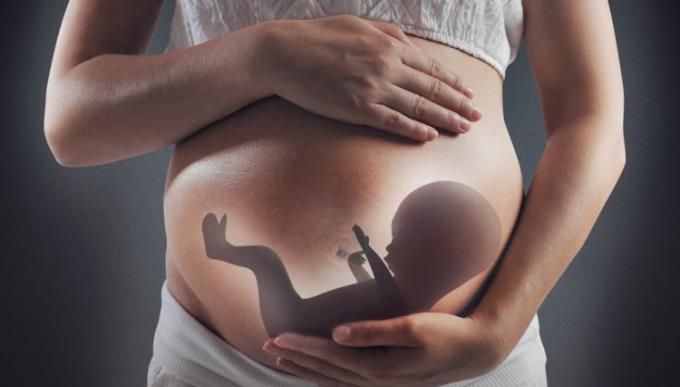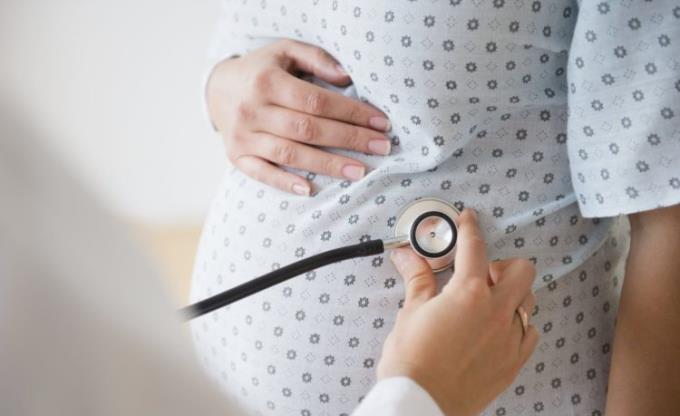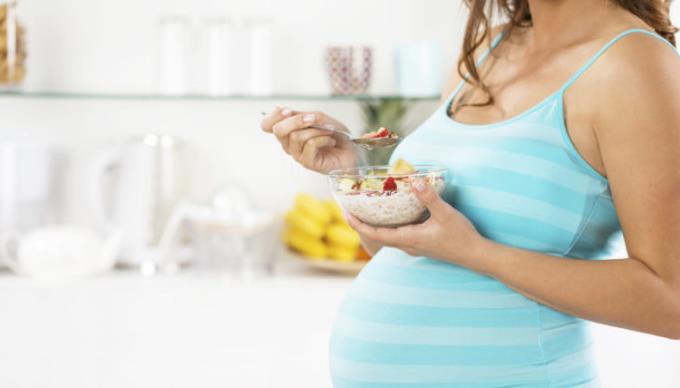Miscarriage is something that no one wants. To minimize this risk, you need to carefully learn the strange signs from the first few weeks of pregnancy so you can see a doctor promptly.
A miscarriage (often referred to as miscarriage) can be a devastating shock to many, lasting effects that make many couples more susceptible to depression, anger, fear and guilt. . In this article, aFamilyToday Health "points out" 9 main reasons as well as measures to prevent you from this situation.
What is miscarriage?

A miscarriage is the loss of pregnancy before the 20th week of pregnancy. According to the American Maternity Association , the rate of miscarriage accounts for about 10 - 15% of the total number of pregnancies. 80% of cases occur before the fetus develops 12 weeks.
Miscarriage and stillbirth are two different problems. Stillbirth means a fetus that dies after 20 weeks of gestation.
The forms that pregnant mothers may encounter:
Complete miscarriage: the embryo leaves your body in one go.
Incomplete miscarriage: your cervix is dilated or thin and parts of the embryo are pushed out of the body gradually.
Empty egg : condition in which the embryo doesn't develop in the uterus;
Recurrent (recurrent) miscarriage: a miscarriage of at least 3 consecutive times. Only about 1% of couples experience this condition.
An ectopic pregnancy: an egg implants somewhere other than your uterus, usually in the fallopian tube. An ectopic pregnancy needs immediate treatment to avoid serious complications.
Threatened miscarriage: presence of bleeding or cramps, warning of risk of miscarriage.
In addition, many women experience miscarriage without realizing that they are pregnant.
Signs of miscarriage from week to week

1. Signs of miscarriage between 1 and 6 weeks
Most pregnant mothers often do not realize they are pregnant when the fetus is only 1-2 weeks old. The only way to know if you are pregnant at this stage is to have a pregnancy test.
A miscarriage can make you feel painful and heavy. If you run the test a week or two later, you will be negative. You will not be able to tell if you are just late due to your period late or have had a miscarriage.
2. Signs of miscarriage between 6 and 12 weeks
Pregnant mothers often feel pain in the pelvis , cramping or vaginal bleeding . Cramps may appear in an early stage and will become more severe with more bleeding. The bleeding may start with small spots and then increase after a day or two. At a certain point, the amount of blood will increase when you have a normal period.
3. Signs of miscarriage between 12 and 20 weeks
At this stage, symptoms such as bleeding or severe pain appear. Mother elected will think this is the time to pass. However, in some cases, rupture of amniotic fluid or bleeding is not a sign that the mother is about to give birth, it is possible that a miscarriage is possible because the cervix is now very weak (open waist).
9 main causes of miscarriage in pregnant mothers

There are many causes of this undesirable situation. Miscarriages that occur in the first trimester (1 to 13 weeks and 6 days) are usually caused by problems with the fetus. During the second trimester (from 14 weeks to 27 weeks 6 days) this happens depending on the health of the mother.
1. Chromosome Problems
According to Healthline , about 50% of miscarriages in the first trimester involve chromosomes. The reason is that the zygote formed from fertilization between the sperm and the egg has problems with the number of chromosomes. This prevents the fetus from growing normally, causing a miscarriage.
2. Problems with the placenta
The placenta is the organ that connects the baby's body with the mother's, transporting nutrients from the mother's body to the fetus for the development of the fetus. Therefore, if there is a problem with the placenta, it can affect the baby's growth and development, even causing a miscarriage.
3. Hormone imbalance
Hormones have an extremely important role in pregnancy. The hormone progesterone, for example, plays an important role in helping the placenta attach to the uterine wall. If the mother's body does not have enough progesterone, the placenta will easily detach and lead to miscarriage.
4. Immune disorders
An immune disorder is when the immune system is overactive or underactive, which can be a risk of recurrence. Simply put, the mother's body does not accept a pregnancy.
5. Health status of pregnant mother
Pregnancy diseases, such as diabetes, high blood pressure, lupus, kidney disease and problems with the thyroid gland, etc., can increase the risk of miscarriage.
The disease limits the blood flow to the mother's uterus, preventing the fetus from developing normally. In addition, pregnant women with polycystic ovary syndrome (PCOS) also have a higher risk of miscarriage. But scientists are still not clear how this happens.
6. Pregnant mother has an infectious disease
If pregnant mother has one of diseases such as rubella , gonorrhea, syphilis and malaria, bacterial vaginosis, HIV, chlamydia infection, cytomegalo virus infection ... can increase the risk of miscarriage. An infection can cause the amniotic sac to rupture prematurely or it may cause the cervix to open too quickly.
7. Food poisoning
Food poisoning can also lead to miscarriage. Food poisoning occurs when eating contaminated food that causes intestinal illness or food poisoning. You should pay attention to:
Bacteria such as listeria can be found in unpasteurized dairy products;
Toxoplasma parasite can be found in raw or undercooked pork or lamb;
Salmonella bacteria can be found in raw or undercooked eggs.
8. Uterine structure
The abnormal uterus as uterine septum, uterine one horn, uterine two horns , ... can cause miscarriage. In addition, the development of fibroids (noncancerous) in the uterus can also jeopardize the development of the fetus.
9. Cervical crotch
The cervical opening can lead to miscarriage. In addition, if the mother's cervix is too weak, it will be difficult to hold the fetus.
Factors that increase the risk of miscarriage

There are several factors that increase the risk of miscarriage, such as:
1. Age of pregnant woman
Pregnancy as you age puts you at a higher risk of losing your pregnancy. According to the American Maternity Association, the risk for each age is:
Women under the age of 35 are about 15% more likely to have a miscarriage;
Women aged 35-45 are 20-35% more likely to have miscarriages;
Women over the age of 45 have a 50% chance of having a miscarriage.
2. There is a weight problem
Being overweight or underweight during pregnancy can make pregnant women face the risk of miscarriage. Research published in the International Journal of Obstetrics and Gynecology found that underweight women have a 72% higher risk of miscarriage in the first trimester of pregnancy, compared to those with weight. normal.
3. Smoking and drinking alcohol
Women who smoke or are smoking and drink alcohol during pregnancy are at a higher risk of not being able to keep their baby than women who never smoke and drink alcohol. Research shows that couples who consume large amounts of alcohol around the time of conception may increase the risk of miscarriage during pregnancy.
4. Use of drugs
Be careful when taking the drug during pregnancy . You should only use this medication when directed by your doctor. Indiscriminate use of drugs can affect the fetus, even miscarriage.
You should be aware that certain medications that may increase the risk of miscarriage such as misoprostol and methotrexate (to treat rheumatoid arthritis), retinoids (to treat eczema and acne), and their medications do not. anti-inflammatory steroids (NSAIDs) such as ibuprofen (to treat pain and inflammation).
5. Ever had a miscarriage
Women who have never been able to keep their baby, especially with two or more miscarriages, are at a higher risk of miscarriage than women who have never had this problem.
6. Deficiency of essential vitamins for pregnancy
Research shows that the lack of vitamin D and B vitamins in the body by pregnant mothers may also increase the risk of miscarriage. Therefore, you should have a varied diet so that your body gets the essential vitamins. Also, talk with your doctor about getting essential vitamins before and during pregnancy.
The course of treatment for miscarriage

If this problem occurs unfortunately at 12 weeks, in the first week after that, the mother will feel a lot of pain and vaginal bleeding. In most cases, vaginal blood will stop on its own. However, if the pain persists and gets worse, seek medical attention as soon as possible. These signs may be due to a problem with the uterus.
Treatment during or after a miscarriage is mainly aimed at preventing bleeding or infection. If the miscarriage occurs early in the first weeks, your body will be able to remove the fetal tissues on its own and without the need for additional medical intervention. If you have a more delayed pregnancy, the most common procedure to stop bleeding and prevent infection is dilatation and curettage (D&C) .
You may be prescribed medication to control bleeding after taking D&C. Also, if you notice an increase in blood counts, start chills or fever, call your doctor right away.
After a period of about 6 weeks, pregnant women should see an obstetrician to learn more about the causes and problems of how long the miscarriage takes to get pregnant , as well as what diet and diet should be . Your doctor can advise you more about rest time and recovery. In particular, you should ask the support from friends and family to feel better!
How to prevent natural miscarriage

For a healthy pregnancy in the future, you should:
Avoid or limit exposure to tobacco smoke, alcohol, stimulants, waste, toxic substances in the environment.
Maintain a healthy weight before and during pregnancy.
Addition of vitamins needed during pregnancy to ensure that you and your baby is growing enough nutrients.
Build a healthy, balanced diet with plenty of fruits and vegetables.
Consult with your doctor or exercise coach when planning to exercise during pregnancy to reduce the risk of harm to the fetus. Reasonable exercise during pregnancy can reduce stress, pain, risk of diabetes in pregnancy and endure when she elected labor .
Avoid certain types of misoprostol , retinoids, methotrexate, and nonsteroidal anti-inflammatory drugs like ibuprofen . You should consult your doctor before using any medicine.

















